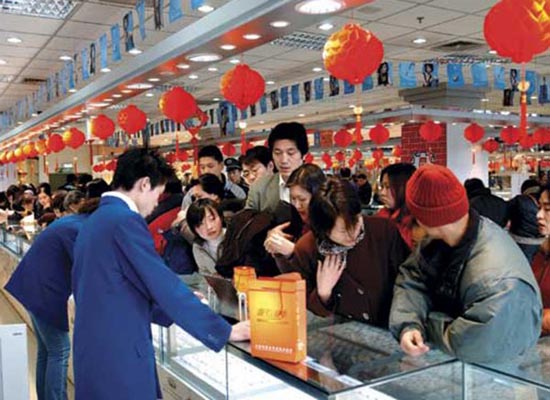
OPINION: China is rapidly becoming a land of the rising middle class - and a force that will either tip or balance the scales on the environmental future of the planet.
Last week the Chinese Academy of Social Sciences released its annual report on the country's urban development and, according to estimates, half of the country's city dwellers will be part of the middle class by 2023.
Based on data from 2000 to 2009, researchers calculated that 37 percent of city dwellers were part of the middle class in 2010.
That percentage is expected to surpass 45 percent in 2019 and exceed 52 percent in 2025, said Zhang Lifeng, a researcher with the Chinese Academy of Social Sciences, as reported by the China Daily.
Although the statistics back it up, you don't need them to realise the demographic of forward-thrusting Chinese cities is shifting - you can see it in the advertising billboards that flank the subways. Smiling young models sport the latest shoes, jeans and diamond rings, their flawless skin smoothed by international-brand cosmetics.
More Chinese have more disposable income.
Global businesses have been salivating at the possibilities for economic growth presented by the trend.
McDonald's sales
On Tuesday, McDonald's reported impressive quarterly sales figures in China despite price increases and said the market is one where they are expanding "aggressively", averaging a new restaurant opening everyday.
In a similar vein, earlier this month, Starbuck's president John Culver reportedly announced a goal of 1500 stores across the country by 2015; China's up-and-comings look set to join their Western counterparts, who in hordes in recent decades ditched a simple instant brew for a frothed-milk-topped espresso, or any one of the myriad of coffee combos available at Starbucks.
In her recently released book The Chinese Dream: The Rise of the World's Largest Middle Class, China-born now US-based author Helen Wang agreed, saying China's burgeoning middle class is "jumping aboard the consumerism train and riding it for all it's worth".
During a talk to promote her book to a crowd of young urbanites at Beijing's trendy 798 art district, Wang's Chinese-delivered speech was peppered with English words and concepts.
"Walk-in closet", "the American dream", "own voice" and "self-centered", all roll of the tongue of the West's well-established middle class, but, as yet, it seems they do not feature in Chinese vocabulary.
On her website, Wang talked about the "new class of upwardly mobile young people, who have modern ambitions and a growing global consciousness".
This growing global consciousness has been illustrated in various social activism campaigns in China in recent years that have successfully halted unwanted urban development projects.
Street rubbish protest
In 2010, for example, close to a thousand residents of Guangzhou took to the streets to protest against the building of a rubbish incinerator near their homes.
Various Western media attributed the ground-swelling of NIMBYism - the "Not-in-my-backyard" sentiment common among middle and upper classes seeking better living standards in their neck of the woods - to the city's upwardly mobile.
Although initiated by peasants, the protest gained traction when internet-savvy young urbanites spread the word online.
International environmental media group Treehugger reported that "hundreds of well-off Chinese caught the attention of international media with a protest against a garbage incinerator being put too close to their homes", while The Telegraph said "China's burgeoning middle class has lodged its first mass challenge against the government by staging a large environmental protest in southern China".
The European Union's climate action commissioner, Connie Hedegaard, agreed that China's middle class are increasingly a green force, telling an audience in Korea earlier this year that pressure from a growing middle class will encourage China's leaders to push ahead with cleaning up the environment.
"China now has had some 400 million citizens entering the middle class, they also demand clean water and air their children can breathe, like others will do."
But although such aspirations may see an eco-emphasis in some places, they don't necessary spell good news for the environmental future of the planet as a whole.
Different sides
In a talk in Beijing on his book When a Billion Chinese Jump: How China Will Save Mankind - Or Destroy It, Asia environmental correspondent for The Guardian Jonathan Watts said: "Economic development will often lead to environmental degradation - they are different sides of the same coin."
However, he argued history showed once per-capita income reached $5,000 to $8,000, the trend reverses, as people decided they were "tired of living in a pig-sty".
He said although some of the environmental clean-up was the result of innovative solutions, "some of it was because of a dirty little secret".
Western societies have generally "outsourced the problem to other countries, to future generations.
"Poor old China ended up being, in a sense, the repository of 200 years of the world's environmental problems."
The question is, where to for the dirty byproducts of China's rising middle class? Watts said "When you get to a country the size of China the issue is the amount of rug left to sweep it under is not so big."
To their credit, China is getting creative and new eco-technologies are a government priority; however, environmental problems that fall into the too-hard basket, rather than being shipped to the developing world as their Western counterparts had the luxury to do, are largely being internalized.
Dirtier industries
"Dirtier industries," said Watts, "are being pushed inland," away from more affluent east-coast settlements.
In a review of Watts' book, The Guardian's Isabel Hilton said: "This book is not simply an indictment of China's development path: it is a lesson for us all in the dangers of how we live."
As Watt's himself summed up to the predominantly expat crowd he talked to in Beijing recently: "China is becoming more like us. And we are the problem."



